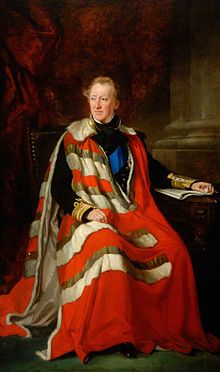Algernon Percy, 4th Duke of Northumberland
|
His Grace The Duke of Northumberland KG, PC, FRS, FSA, FRGS, FRAS, , |
|
|---|---|

Duke of Northumberland by Francis Grant
|
|
| First Lord of the Admiralty | |
|
In office 28 February 1852 – 17 December 1852 |
|
| Monarch | Queen Victoria |
| Prime Minister | The Earl of Derby |
| Preceded by | Sir Francis Baring, Bt |
| Succeeded by | Sir James Graham, Bt |
| Personal details | |
| Born | 15 December 1792 |
| Died | 12 February 1865 (aged 72) |
| Nationality | British |
| Political party | Conservative |
| Spouse(s) | Lady Eleanor Grosvenor (d. 1911) |
| Relations | Hugh Percy, 2nd Duke of Northumberland (father) |
| Alma mater | St John's College, Cambridge |
| Military service | |
| Allegiance |
|
| Service/branch | Royal Navy |
| Years of service | 1805–c.1862 |
| Rank | Admiral |
| Commands | HMS Cossack |
| Battles/wars | Napoleonic Wars |
| Awards | Knight of the Order of the Garter |
Admiral Algernon Percy, 4th Duke of Northumberland KG, PC (15 December 1792 – 12 February 1865), styled Lord Algernon Percy from birth until 1816 and known as Lord Prudhoe between 1816 and 1847, was a British naval commander, explorer and Conservative politician.
Northumberland was the second son of General Hugh Percy, 2nd Duke of Northumberland, and his second wife Frances Julia, daughter of Peter Burrell. He was educated at Eton and St John's College, Cambridge.
Northumberland entered the Royal Navy in March 1805, aged 12, on board HMS Tribune and served in the Napoleonic Wars. In 1815, when only 22, he was promoted to captain, taking command of HMS Cossack in August, and commanding her until she was broken up some 10 months later. The following year, aged 23, he was raised to the peerage as Baron Prudhoe, of Prudhoe Castle in the County of Northumberland (Prudhoe being a town in Northumberland). He later became an Admiral in the Royal Navy. Between 1826 and 1829 he was part of an expedition to Egypt, Nubia and The Levant. In 1834, he travelled to the Cape of Good Hope with John Herschel to study the southern constellations.
...
Wikipedia
